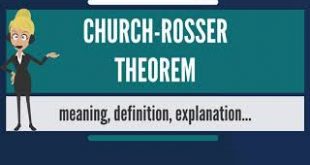Well, the actual headline on the front page of the Washington Post below the fold today reads, "Economy shows strong growth, could provide GOP momentum." The strong growth is the 3.0% annual growth rate of GDP in the third quarter (supported by a strong stock market), with the momentum not being the obvious point that this might lead to general popular electoral support in the future for the GOP, but more specifically that this somehow might aid the GOP in Congress to change the current...
Read More »A Serious Misreading of Coase
Corey Robin is very insightful about a lot of things. I think his take on conservatism, that the thread running through it is opposition to attempts to demolish pre-existing hierarchies, explains ideological twists and turns that would otherwise remain mysterious. Don’t take this post as an expression of anti-Robinism.But CR seriously misreads economic texts that abut political theory. I felt this way about his analysis of Hayek, which simply ignores the centrality of his lifelong...
Read More »What is CHURCH-ROSSER THEOREM? What does CHURCH-ROSSER THEOREM mean? CHURCH-ROSSER THEOREM meaning
✪✪✪✪✪ http://www.theaudiopedia.com ✪✪✪✪✪ What is CHURCH-ROSSER THEOREM? What does CHURCH-ROSSER THEOREM mean? CHURCH-ROSSER THEOREM meaning - CHURCH-ROSSER THEOREM definition - CHURCH-ROSSER THEOREM explanation. Source: Wikipedia.org article, adapted under https://creativecommons.org/licenses/by-sa/3.0/ license. SUBSCRIBE to our Google Earth flights channel - https://www.youtube.com/channel/UC6UuCPh7GrXznZi0Hz2YQnQ In mathematics and theoretical computer science, the Church–Rosser...
Read More »Marxism-Leninism In China Update
The once-every five years Chinese Communist Party conference is now over. It appears that Xi Jinping has not identified an heir to himself as his two predecessors did at the time of this equivalent meeting during their presidencies. Furthermore, unlike either of them, Xi has joined Mao and Deng Xiaoping in having his work identified in the Chinese constitution as being an official part of Chinese ideology. Most observers consider this a sign that even if Xi gives up one or maybe even two...
Read More »Corporate Profit Tax Cuts and Wages: the UK Experience
Kimberly Clausing and Edward Kleinbard have each written some interesting papers on transfer pricing. Here they team up on a different topic: The President’s Council of Economic Advisers claims that slashing the corporate tax rate to 20 percent would boost the average American’s wages by $4,000 per year (“very conservatively”) — and perhaps by as much as $9,000. If true, that would be a remarkable gain for working Americans. Unfortunately, it’s extraordinarily unlikely to be true. The two...
Read More »Remembering Black Monday
The largest single one day decline in percentage terms of the Dow-Jones average (22.6%) happened 30 years ago today, on October 19, 1987. It was a Monday, hence "Black Monday." Although unlike after the second largest such one day decline in percentage terms (12.8%) on October 28, 1929, the US economy did not go into a decline, much less anything remotely resembling the Great Depression. Indeed, the very next day, after starting to decline further in the morning, the market turned around...
Read More »The Dow Chemical Demonstration In Madison, October 18, 1967
A half century ago today on the University of Wisconsin campus in Madison, Wisconsin was the first seriously violent demonstration against the war in Vietnam, which resulted in 76 injuries. It brought a resounding end to the naïve idealism of the "Summer of Love" atmosphere that had gripped Madison and other parts of the country earlier during 1967, the peak year of flower power hippie love movements. A hail of tear gas and billy clubs brought such views to a hard end in Madison on October...
Read More »Marxism-Leninism And The Chinese Communist Party Congress
At this moment I am watching live on Bloomberg News the opening speech by President/Party General Secretary/Chairman of the Military Commission Xi Jinping of the once-every-five-years Chinese Communist Party Congress. This is far more important than what one finds on other TV networks whether pro-Trump right now (how great his tax plan/tromping on immigrants and football players are) or anti-Trump (what is the latest gossip from the Mueller investigation and will Republicans in the Senate...
Read More »Iraq Conquers Kirkuk
The central Iraqi government based in Baghdad has conquered oil-rich and ethnically-mixed Kirkuk from its recent Kurdish rulers, who hoped to continue ruling it as part of their recently declared independent state of (Iraqi) Kurdistan, clearly consisting of three provinces, but which they also wanted to include the fourth one of Kirkuk province. This now appears not to be going to happen.Juan Cole has made an excellent discussion of this, noting 7 reasons why this is not about Iran as many...
Read More »The Case of the Spitting Legionnaire
A couple of days ago, the New York Times published an opinion piece by Jerry Lembcke "The Myth of the Spitting Antiwar Protester." Lembcke wrote a book a few decades ago debunking that myth but it is still going strong... stronger than ever, actually. The trope of "they're spitting on our veterans" is popular with anti-kneeling fanatics who maintain that athletes who protest during the national anthem are "spitting on the graves" of those who died to defend the flag and the freedom to do as...
Read More » EconoSpeak
EconoSpeak


